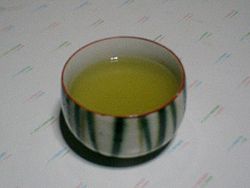Green tea
| Potentially edible! Food woo |
| Fabulous food! |
| Delectable diets! |
| Bodacious bods! |
Green tea is a delightfully light tea that is dried in such a way that it does not darken like black tea. The leaves are less oxidized and it has a shelf life of a year (more or less), unlike black tea, which can last for years and years in drinkable condition if kept dry.
Green tea's inclusion here, however, is due to its woo status as the Next-Best-Panacea-and-Weightloss-Drink ever! Maladies other than a fat ass for which it's touted as a treatment include baldness in both men and women,[1] and that pesky malady called "cancer".[2]
The two sides[edit]
Please Buy Me[edit]
- It works, and I've got all kinds of scientificky sounding stuff here to convince you.
- I link to all kinds of articles you've never heard of, from sources you've never heard of, and some of my super-uber links even work.
- I'm a critic. Really, really I am. But long and hard research has convinced me!
We remain highly dubious[edit]
- Web MD says there is a study on mice suggesting green tea helps oxidize fat. There is also some suggestion that the routinization of drinking tea helps a person focus on remaining on a diet. Expected loss by tea alone is minimal, under 5 lbs. Most importantly, any ol' green tea is as good as the expensive "weight loss stuff" sold at exorbitant prices. And by the way, sorry to say, you still have to diet with the tea.
- FDA: Green tea is an uber tasty drink that actually may do some good. So might walking every day.
- There is some evidence that green tea extract could be associated with liver toxicity.[3][4][5] So don't get to thinking that more (or more concentrated) is necessarily better.
The conclusion[edit]
Caffeine speeds up your metabolism a bit. There's also more theobromine (which is related to caffeine and works a bit like it) than in black tea, and a slightly higher concentration of Vitamin C. Some forms of tea, including green tea, contain L-theanine, an amino acid, which has been shown to very mildly reduce anxiety. Tea, depending a bit on where it's grown, can reduce tooth decay; this is because tea plants are great at soaking up all that delicious fluoride in the soil.
Tea, wine, chocolate, açaí berries, are all yummy additions to a healthy diet and have numerous potential positive side effects. Eat them, enjoy them, but don't expect miracles here.
Also, large doses can impede the effectiveness of chemotherapy for treating cancer.[6] In rare cases, people has come down with hepatitis from green tea — possibly from a contaminated batch from sketchy on-line sources.[7][8][9][10] These individual cases are in basic agreement with a recent meta-analysis which found that concentrated doses of catechin-rich green tea preparations resulted in hepatic adverse events.[11]
Avoid herbal supplements with green tea extract. If you enjoy green tea, drink it in moderation.
See also[edit]
References[edit]
- ↑ http://www.hairloss-research.org/LinkGreenTearaisesSHBG1-08.html
- ↑ http://www.cancer.org/Treatment/TreatmentsandSideEffects/ComplementaryandAlternativeMedicine/HerbsVitaminsandMinerals/Green-Tea
- ↑ Hepatotoxicity of green tea: an update by G. Mazzanti et al. (2015) Arch. Toxicol. 89(8):1175-91. doi: 10.1007/s00204-015-1521-x.
- ↑ Scientific and Regulatory Perspectives in Herbal and Dietary Supplement Associated Hepatotoxicity in the United States by Mark I. Avigan et al. Int. J. Mol. Sci. 2016 Mar; 17(3): 331. doi:10.3390/ijms17030331.
- ↑ 'The food supplement that ruined my liver' (25 October 2018) BBC News.
- ↑ green tea is one of the treatments considered in this study.
- ↑ Girl Develops Acute Hepatitis After Drinking Unusual Green Tea by Laura Geggel (October 06, 2015) Live Science.
- ↑ Chinese green tea and acute hepatitis: a rare yet recurring theme by Sebastian Thomas Lugg1 et al. (2015 BMJ Case Reports doi:10.1136/bcr-2014-208534.
- ↑ Fulminant hepatitis during self-medication with hydroalcoholic extract of green tea by R. Gloro et al. (2005) Eur. J. Gastroenterol. Hepatol. ;17(10):1135-7. doi:10.1097/00042737-200510000-00021.
- ↑ Concentrated green tea extract induces severe acute hepatitis in a 63-year-old woman--a case report with pharmaceutical analysis by M.H. Pillukat (2014) J. Ethnopharmacol. 155(1):165-70. doi:10.1016/j.jep.2014.05.015.
- ↑ The Safety of Green Tea and Green Tea Extract Consumption in Adults - Results of a Systematic Review by Jiang Hu et al. (2018) Regulatory Toxicology and Pharmacoloy 95:412-433. doi:10.1016/j.yrtph.2018.03.019.
